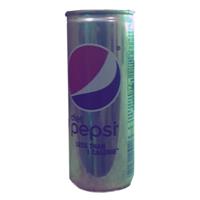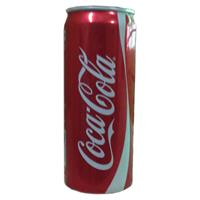
Diet-Pepsi
Products in ‘Carbonated-Aerated Drinks’ category range from 0.5 - 0.5


- Artificially sweetened beverages may promote weight gain
Artificial sweeteners such as aspartame provide intense sweetness but lesser calories. Lesser calories should mean weight loss, but,studies show that artificially sweetened beverages may promote weight gain.
When you consume normal sugar (glucose) the body accurately determines that it has received enough calories, thereby signaling satiety or fullness. Incase of artificial sweetners like aspartame, the body assumes calories received due to the sweet taste, but as it keeps waiting for the calories to come, the appetite is activated and sensations of hunger remains. Thus Aspartame can make you gain weight, by stimulating your appetite, increasing your cravings for carbohydrates (such has highly sweetened foods and drinks) and assisting in fat storage
Thus, even though the product contains hardly any calories, it may increase your calorie consumption. Better to avoid ASB ( Artificially sweetened beverages)
- Know your additive - E338 (Phosphoric Acid)
Calcium and phosphorus are essential minerals found in the bone, blood and soft tissue of the body and have a role in numerous body functions. Our body takes every effort to maintain the delicate balance maintained between calcium and phosphorus.
A slight rise in phosphorus can upset this balance, causing it to release the Parathyroid Hormone (PTH), a calcium-balancing hormone.
Phosphorus, in the form of a food additive, gains easy entry into the blood , increasing the phosphorus levels thus causing an imbalance in calcium:phosphorus relationship.The body then releases PTH, which will result in releasing calcium from your bones, causing bone loss. Hence there is a likelihood of low bone mineral density.
- Know your Food - Flavouring SubstancesFlavouring Substances are added to Food products either to regain the flavour it would have lost during processing e.g. juices or to add a new desired flavour e.g. in case of biscuits, vanilla flavour may be added to otherwise food product without any flavour.Based on the resemblance of the flavouring substance to its natural occurrence, it is classified as natural, nature identical or artificial flavouring substance. Read this blog to find more about different flavouring substances.
- Know your ingredient- Carbonated WaterCarbonated water is water into which carbon dioxide gas has been dissolved. This is a process that causes the water to become effervescent.
For people who enjoy drinking soft drinks, carbonated water (soda) can provide a calorie- and sugar-free substitute.
But problem arises when it is taken on regular basis, as too much of carbon dioxide builds up acidic level of the blood and may create problems like Bloating, Ulcers etc.
Enjoy the drink in limitation! - Sweetened with Artificial IngredientsYou Have a Sweet Tooth but need to control blood sugar or reduce calorie intake from sugary food, Artificial Sweeteners must feel like a boon for you.
Please be aware of the controversies around the artificial sweeteners that these ingredients cause gastric discomfort, laxative effect as well as destroy some beneficial micro-organisms present in the stomach.So switching out of artificial sweeteners to all-natural, low-sugar substitutes or just controlling your taste bud is a smart option.
- Contains Caffeine!!The Prevention of Food Adulteration allows a limit of 145 parts per
million (ppm) i.e 140mg of caffeine in carbonated beverages.
There is 32mg of caffeine in a 330ml can of Coca-Cola
Moderate caffeine consumption per day should be less than 200mg per day. Approximately 2 cups of Instant coffee is enough to reach the upper limit of caffeine (300mg/day).
Caffeine is thought to fight fatigue and provide a sense of alertness.
Hypertensive, Cardiac patient should avoid it, as it raises BMR, respiration rate, BP. Heavy daily caffeine use may cause side effects such as :Insomnia, Nervousness, Restlessness, Irritability, Stomach upset, Fast heartbeat, Muscle tremors etc.
Disclaimer:Product Analysis is based on general practices in the field of Nutrition. Please check with or consult a qualified and licensed medical professional for its suitability to you.













